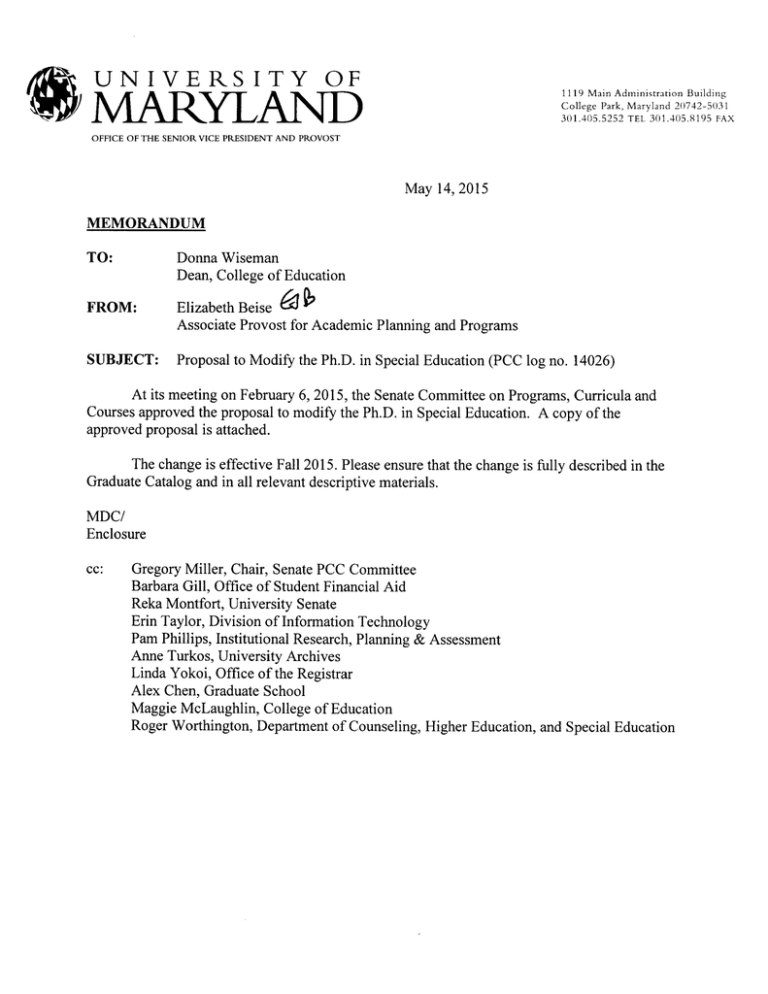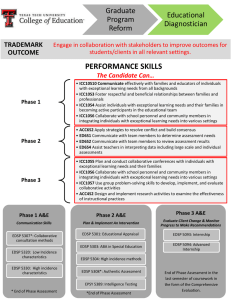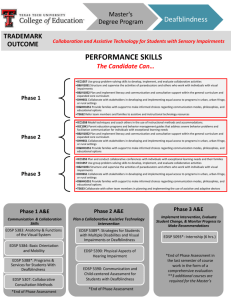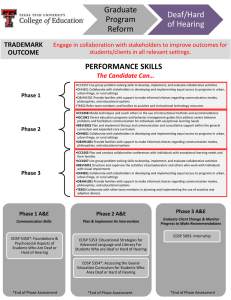MARYLAND U N I V E RS I T...
advertisement

U N I V E RS I T Y OF
1119 M a i n A d m i n i s t r a t i o n B u i l d i n g
MARYLAND
C o l l e g e Park, M a r y l a n d 2 0 7 4 2 - 5 0 3 1
301.405.5252 T E L301.405.8195 FAX
OFFICE O F T H E SENIOR VICE PRESIDENT AND PROVOST
May 14, 2015
MEMORANDUM
TO:
Donna Wiseman
Dean, College of Education
FROM:
Elizabeth Beise
Associate Provost for Academic Planning and Programs
SUBJECT:
Proposal to Modify the Ph.D. in Special Education (PCC log no. 14026)
At its meeting on February 6, 2015, the Senate Committee on Programs, Curricula and
Courses approved the proposal to modify the Ph.D. in Special Education. A copy of the
approved proposal is attached.
The change is effective Fall 2015. Please ensure that the change is fully described in the
Graduate Catalog and in all relevant descriptive materials.
MDC/
Enclosure
cc:
Gregory Miller, Chair, Senate PCC Committee
Barbara Gill, Office of Student Financial Aid
Reka Montfort, University Senate
Erin Taylor, Division of Information Technology
Pam Phillips, Institutional Research, Planning & Assessment
Anne Turkos, University Archives
Linda Yokoi, Office of the Registrar
Alex Chen, Graduate School
Maggie McLaughlin, College of Education
Roger Worthington, Department of Counseling, Higher Education, and Special Education
T H E UNIVERSITY O F MARYLAND, C O L L E G E PARK
PROGRAM/CURRICULUM/UNIT PROPOSAL
•
Please email the rest of the proposal as an MSWord attachment
to pcc-submissions(S).umd.edu.
•
PCC LOG NO.
Please submit the signed form to the Office of the Associate Provost
for Academic Planning and Programs, 1119 Main Administration Building, Campus.
College/School:
EDUC-Education
Please also add College/School Unit Code-First 8 digits: 01203100
Unit Codes can be found at: https://hvpprod. umd. edu/Html
Reports/units,
htm
Department/Program:
Please also add Department/Program Unit Code-Last 7 digits: 1312301
Type of Action (choose one):
XD Curriculum change (including informal specializations)
U Curriculum change for an LEP Program
U Renaming
ofprogram
or formal
•
Addition/deletion
•
Suspend/delete program
of formal
• New
academic degree/award
program
• N e w Professional Studies award iteration
Area of Concentration
• N e w Minor
• Request to create an online version o f an exi
Area of Concentration
program
Italics indicate that the proposed program action must be presented to the full University Senate for consi
Summary of Proposed Action:
The Special Education PhD Program in the Department of Counseling, Higher Education a
to make a minor revision to its existing doctoral degree. These changes include renam
contemporary language; clarifying that the doctoral program is 60 credits and requires
for admission whereas previously the PhD had been advertised as 90 credits with the pr
from the Master's degree could be counted toward the 90; and requiring that elective c
area and be restricted to 15 credits whereas before the number of credits could vary
advisor. The Doctoral Learning Outcomes Assessment Plan was updated and enhanced.
Attached please find the narrative summarizing these changes along with several tables
the course titles, examples of the informal specializations elective areas, and Doctor
Departmental/Unit Contact Person for Proposal:
Margaret McLaughlin mim(g)umd.edu
A P P R O V A L S I G N A T U R E S - Please print
2.
3
4,
5
6,
7
8
name, sign, anddqte.
Use additional lines for
multi-un
PCC Curriculum Change (Including Informal Specialization)
Special Education PhD Program
The Special Education Program (EDSP) is proposing changes to the PhD degree. These modifications
include a reorganization of the course sequence, reorganizing the informal areas of specializations, an
changes in the process for advancing to candidacy. The rationale for these changes is partly a result o
reviewing data from the 2012 and 2013 Special Education learning outcomes assessments report (e.g.
doctoral students would benefit from additional research methods coursework and research
apprenticeships prior to the dissertation process; the need to revise candidacy requirements). The
changes are also a result of emerging areas of research and new faculty in the special education
program. The proposed changes includetheEDSP/i^nnuo/ Review Process and the EDSP Doctoral
Graduate Learning Outcomes Assessments.
Explanation of the Impact of the Changes
Changes to Sequence of Courses and Informal Elective Area
Table lis attached and provides a side-by-side
The table includes the specific course work and the number of credits. The
changes will not require additional resources or faculty.
•
The current program requires 90 credits including up to 30 credits from the master's degree.
The proposed program requires a minimum of 60 credits and a master's degree from an
accredited institution (an admission criterion).
•
The number of credits in the EDSP Required Courses remains the same.
EDSP 888A College Teaching Internship has been replaced by a EDSP 798X Seminar in
Education: College Teaching, which is acourse that will emphasize teaching techniques and
theories at the college (adult) level; technology and universal design needed to deliver
engaging and blended learning courses. In the current program, doctoral students often
taught college courses without such knowledge. Students and their advisor may determine
that teaching or co-teaching a course is in line with the student's goals and EDSP 888Awill
then be taken as one course in the elective area.
Courses and credits in the Research Methodology and Design Courses that have been
changed in the proposed program include: 1) EDMS 645 Quantitative Research Methods I or
equivalent at time of admission as a criterion for admission to the EDSP doctoral program; 2)
EDSP 671 Qualitative Research in Special Education remains in the sequence with an option f
replacing this course with a mixed methods course if it better matches a student's research
interests; and 3) an intermediate level quantitative or qualitative methods course has been
added, so candidates are better prepared to design and conduct research.
•
Dissertation Research (EDSP 898 and 899). The credits have been red uced from 18 in the
current program to 15 in the proposed program.
•
Elective Area In the proposed program, candidates and their advisor choose courses to make
up an informal elective area (15 credits). The elective area will broaden a doctoral candidate's
understanding of a specific body of disciplinary knowledge. In the current or old program, the
specialty areas were defined by the curricula (e.g., coursework in learning disabilities or
behavioral disabilities). This change to elective areas will provide more flexibility to students
to engage in interdisciplinary coursework and research experiences. It also provides an
opportunity for new faculty to pursue emerging areas of research in the field.
The revised EDSP Annual Review documents are attached (Tables 2 and 3). The process used in the
EDSP Annual Review for Years land 2 remain the same (Table 3, p
a student completes a selfassessment (form); his or her advisor provides feedback on the student's progress over the year;
and the EDSP Graduate Committee provides feedback to the student in a letter.
The proposed changes are for the Graduate Committee to review the Rubrics that have been revised
or newly developed linking learning outcomes and assessments to the required courses in special
education. The letter to the student after each annual review has been revised to inform him or her of
satisfactory or unsatisfactory progress. In the event of unsatisfactory progress, the Graduate
Committee will provide specific recommendations to the student as a condition of continuing the
program. Failure to follow through with the recommendations may result in a recommendation from
the EDSP Graduate Committee that the student be dismissed from program. This recommendation
would go to the UM Graduate School after discussion with the student's advisor.
Several proposed changes to the EDSP PhD program are the result of faculty discussions from the rep
-EDSP Evaluation of Learning Outcomes for 2012 and 2013. The results of the doctoral le
outcomes assessments were used to determine: what courses and experiences worked well in the
program and what modifications were needed for program improvement to enhance student
competence (e.g., the Qualifying Exam known asthe FacultyAdvisoryCommittee(FAC) will be replaced by a
Comprehensive Portfolio Review,Table3p.2; EDSP Annual ReviewsforDoctoral Students were revised t
incorporate Rubrics from the coursework, Table 3, p.l).
program categories were revised to reflect a stronger mission on preparing future researchers,
policy makers and teachers for positions in higher. This information is presented in the attached Tab
2 Special Education DGOA. Under each, the EDSP faculty revised the learning outcomes; the
assessments associated with the outcomes, and added the stages of grad uate careers (e.g., early and
late stages of assessment). The learning outcomes assessments are tied directly to the courses
through assignments with rubrics.
In addition, the annual reviews and a new comprehensive portfolio review will be used by the EDSP
Graduate Committee to review and evaluate students' progress toward degree. This information is
presented and attached in Table 3Special Education DGOA: Assessments and Program Benc
2. The Benchmarks will allow EDSP faculty to determine the percentage of students who pass the
milestones for the Learning Outcomes and the percentage that leave the program before obtaining a
degree. Our expectation is that 80% of the doctoral students will pass or meet the expectations
associated with each review stage identified in Table 3.
The current program incorporates a Doctoral Pre-Candidacy Exam that uses a Faculty Advisory
Committee (FAC) to determine if a student is ready to advance to candidacy. The FAC consists of two
options: A Review of the Literature Paper or a Pilot Study. Both options involve a written
methodological review or pilot study and an oral presentation evaluated by the FAC.
In the proposed program, a will replace the FAC. The Comprehensive
Portfolio Review will take place once the student has finished his or her coursework. During the
semester when the student is enrolled in EDSP 898, the student and his/her advisor will determine the
items to include in the Portfolio along with writing or finishing selected items from the student's
coursework and apprenticeships. Each student will submit a portfolio with the required items. In
addition, the student will be required to give an oral presentation to two members of the EDSP
Graduate Committee and the Advisor regarding their Synthesis Paper.
2) identifies the required products for the during the mid
assessment stage. In terms of evaluation, students must show evidence of scholarship and mastery of
their academic discipline as well as professional practice (teaching and service). The products used for
evaluation of scholarship and mastery of academic discipline will include:
The synthesis will be an interpretative paper or an article/chapter for a field of
specialization and a choice of one the following:
• First or co-authored published journal article, or article submitted for publication to a peerreviewed journal.
• First or co-authored published chapter, or chapter submitted for publication. Chapters
should be published in reputable academic publishing houses or university presses.
• First or co-authored policy paper or brief published or submitted for publication.
•
Pilot Study (Description and Result) with Advisor's Sign-off
•
The products used for evaluation of professional practice will include at least two of the
following:
• Research Internship: Description of agency, grant, or study, responsibilities, products if
applicable, and evaluation of participation.
• First or co-authored conference presentation
• Grant proposal for a research project, personnel preparation
• Service or leadership experience or Internship
Twoofthree Grad uate Committee mem berswillreviewthe Portfolio and evaluate the oral
presentation to determine ifthe student has obtained afor
this stage of the review.
If the student obtains a satisfactory by all members of the Grad uate Committee, he or she will
advance to candidacy. In the event a student does not obtain a Satisfactory, he or she will be given on
opportunity to revise and resubmit the itemsthat are considered unsatisfactory. The EDSP Grad uate
Committee will provide specific recommendations for the revisions; these changes must be submitted
to the Grad uate Committee within six months of the first review. If the candidate does not obtain a
Satisfactory on the Comprehensive Portfolio during the second review, he or she may be recommended
for dismissal from the program (this is summarized in Table 2).
Table 1 Comparison of Special Education PhD Proposed and Current Coursework
A master's degree from an accredited
institution (an admission criteria)
Issues and Trends in Educating
Individuals with Disabilities (3)
60
90
Coursework could include up to 30 Credits
from master's degree from accredited
university
Doctoral Research Seminar (3)
Legal and Policy Foundations for
Individuals with Disabilities (3)
Policy Issues Affecting Individuals
with Disabilities (3)
Seminar in Special Education: College
Teaching (3)
College Teaching Internship in
Special Education
Theory and Empirical Design in
Educational Research (3)
Theory and Empirical Design in
Special Education (3)
Research Apprenticeship in Special
Education (3 min up to 8)
Internship in Special Education (38)
Single Subject Research Designs (3)
Single Subject Research in
Special Education (3)
Must have completed or equivalent at
time of admission
Quantitative Research Methods 1
(3) or equivalent
Quantitative Research Methods II (3)
Quantitative Research Methods II
(3)
Applied Multiple Regression Analysis
(3)
Qualitative Methodologies in
Special Education or equivalent
Seminar in Mixed Methods:
Analysis of Teaching Quality
Introduction to Multilevel
Modeling
Applied Multiple Regression
Analysis (3) 3 credit equivalent at
intermediate level demonstrating
competence in single subject or qualitative
research
Qualitative Methods in Special
Education or equivalent (3)
Table 1 Comparison of Special Education PhD Proposed and Current Coursework
18
EDSP 898 Pre-Candidacy Research (minimum 3)
EDSP 898 Pre-Candidacy Research (6)
EDSP 899 Doctoral Dissertation Research (12)
EDSP 899 Doctoral Dissertation Research
(12)
15 Varied
Example Elective Area: A student may
choose to take additional research
methodology courses in lieu of elective
area
Example Elective Area: A student may choose to
take additional research methodology courses in lieu
of elective area
Literacy/Language Development
Selected Topics in Special Education:
Empirical Research in Language and Literacy
Difficulties (3)
Applied Linguistics (3)
Language and Literacy Development (3)
Cognitive Neuroscience of Language (3)
Language Disorders in Children (3)
Research and Theories in Second
Language Acquisition (3)
Intensive Interventions for Students with Persistent
Academic and Behavior Needs
Selected Topics in Special Education:
Instruction and Interventions for Students with
Learning and Behavioral Needs (3)
Selected Topics in Special Education:
Designing intensive interventions for students with
severe reading disabilities (3)
Designing Intensive Interventions for
Social and Academic Skill Development for Students
with Persistent Needs (3)
Seminar in Special Education: Social
Communication Strategies for Individuals with
Autism Spectrum Disorder (3)
Apprenticeship in Special Education (1-8)
Determined with Advisor
Could include up to 30 credits from
master's work and additional courses
in these areas:
• Learning Disabilities
•
Secondary and Transition Special Ed
•
Behavior Disorders
•
Severe Disabilities
•
Early Childhood Special Education
•
Policy Studies
Table 2: Special Education Doctoral Graduate Outcome Assessments
The DGOA are organized around three categories including:
• Research and Scholarship
• Disciplinary Knowledge
Leadership and Professional Knowledge
Learning Outcomes, w i t h i n each category, are assessed using rubrics f r o m courses t o demon
reviews. These include Annual Reviews {Progress t o Degree), a Comprehensive Portfolio Rev
dissertation process. The DGOA process provides a way f o r students t o determine t h e outco
timely manner each year and f o r faculty t o review benchmarks and t o revise program outcom
program based on t h e collection of data.
•
Designandexecutestudy appropriate to
exam the problem
Formulate a research
problem that responds
EDSP 899 Doctoral Rubric: Dissertation Proposal
to identified gaps in
Exam
professional literature Dissertation
Research
Demonstrate research
competence including
the ability to:
•
Analyze, interpret
data
Satisfacto
Dissertatio
EDSP 888 Research Comprehensive Portfolio ReviewSatisfacto
Apprenticeship or
Candidacy
EDSP 898 Predissertation Research
Revise an
Opportuni
•
Demonstrate an
understanding of the
history, issues, and
policies related to
persons with disabilities
or at risl< for disabilities
EDSP 600 Issues and
Trends in Educating
Individualswith
Disabilities
EDSP 675 Legal and
Policy Foundations for
Individualswith
Disabilities
Rubric: Policy
project/paper
Rubric: Two short Integrative
Review Papers
Satisfacto
promise in
and apply
and servic
disabilitie
Satisfacto
promise in
quality, sy
from resea
appropria
Rubric: Dissertation Proposal
Exam
Comprehensive Portfolio
Review
Rubric: Interpretative Analysis
Paper
Satisfacto
dissertati
Satisfacto
dissertati
original a
knowledg
Satisfacto
demonstr
three cate
correspon
advances
Satisfacto
sustained
writing qu
synthesiz
understan
methods,
which inc
Satisfacto
literature
problem,
subject re
Rubric: Dissertation Final
Exam
EDSP 670 Single Subject Rubric: Single Subject Study Paper
Demonstrate understanding
Research Designs
of the theoretical and
empirical foundations within
special education and
elective area
EDSP 872 Theory and
Empirical Design in
Education
EDSP 898 Predissertation Research
EDSP 899 Doctoral
Dissertation Research
EDSP 899 Doctoral
Dissertation Research
Translate research to practice EDSP 798X Seminar in Rubric: Teaching Collection
Special
Education:
and demonstrate use of
College Teaching
evidence based practices
Apply principles of UDL for
teaching at the college level
and/or in professional
development activity
Comprehensive Portfolio Review
EDSP798X Seminar in Rubric: UDL and technology
Special Education:
College Teaching or
EDSP 888(A)
Apprenticeship In
Teaching
EDSP 898: PreDemonstrate the ability to
provide service to profession Candidacy Research
Satisfacto
ability to c
blended le
presentati
procedure
course top
Satisfacto
or makes
national le
data from
use of UD
integratio
presentat
Satisfacto
competen
and corre
advances
Satisfacto
competen
Statement
Profession
portfolio i
Comprehensive Portfolio Review
Demonstrate the ability to
write effectively regarding
leadership, advocacy
experiences and/or teaching
philosophy
EDSP 898: PreCandidacy Research
Demonstrate the ability to writeEDSP 872 or elective Comprehensive Portfolio Review
and communicate the outcomes
of research to multiple audiences
Satisfacto
competen
review an
oaoer
Satisfacto
dissertatio
EDSP 899: Doctoral
Rubric: Dissertation Final Exam
Dissertation Research
Table 3: Special Education DGOA: Assessments and Program Benchm
What % of students receives a Sati
Student self-evaluates progress for the year by completing form.
Student forwards form to advisor to sign off and provide additionalReview in Year 1?
comments if necessary.
What % of students receives a Uns
Two members of the EDSP Graduate Committee review the form and
conditions
determine ifthe student has Satisfactory or Unsatisfactory
Progress. specified for continuing
The student and the advisor receive a letter with the outcome of theReview in Yearl? In what categorie
are there
difficulties?
review. In the event of unsatisfactory progress, conditions to continue
in
the program are specified by the Graduate Committee and failure to
meet those conditions may result in a recommendation of dismissal
What % of students receives Satis
Review in Year 2?
from the program.
What % of students receives Unsa
Products for Annual Reviews*
Review in Year 2? In what categorie
• Annual Review Form for Student and Advisor
there difficulties?
•
Review Form Graduate Committee
• Completed Rubric from EDSP 600 Review of Literature
What % of students does not conti
• Completed Rubric from EDSP 798X:Seminar in Special Education:
reasons?
College Teaching
• Completed Rubric from EDSP 675 Policy Paper or Project
• Completed Rubric from EDSP 670 Single Subject Design
Study (Paper)
• Completed Rubric from EDSP 872 Interpretative Analysis
(Synthesis Paper)
* Completed Rubrics during the first two years will vary depending on the
course schedule.
What % of students participated in
or internships?
What % of students participated in
presentations?
What % of students submitted or
What % of students revises and re
the following
Portfolio within six months of first
First or co-authored published journal article
First or co-authored published chapter
What % of students does not conti
First or co-authored policy paper or brief
Pilot Study (Description and Result) with Advisor's Sign-off what reasons?
the following
Research Internship
First or co-authored conference presentation
Grant proposal for a research project, personnel preparation
Service or leadership experience or Internship
Teaching Apprenticeship
•
•
•
•
What % of students receives a Sati
Student submits Comprehensive Portfolio with Advisor Approval Comprehensive Portfolio on first a
EDSP Graduate Committee reviews the Portfolio for products and
evidence of competence in the three categories of learning outcomes.
What % of students receives a revi
Portfolio on first attempt? In what c
outcomes are there difficulties?
•
•
•
•
•
What % of students taught or co-ta
What % of students receives a Sati
exam on the first attempt?
Student complete all forms required by the Graduate School related to
dissertation process
What % of students must revise an
Dissertation committee completes the following:
what reasons?
What % of students receives a Sati
final exam on the first attempt?
What % of students must revise an
what reasons?
What % of graduates is employed
Survey sent to graduates and to candidates who did not finish degree
byother type of other employme
What
Graduate Committee
graduates obtain?
What strengths do graduates ident
What needs do graduates identify f


